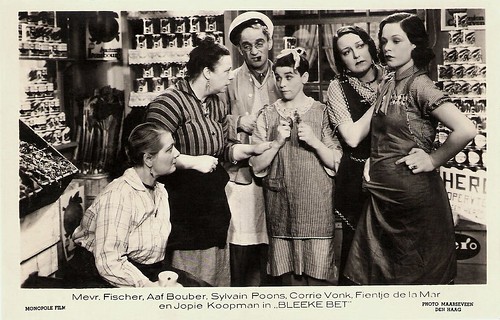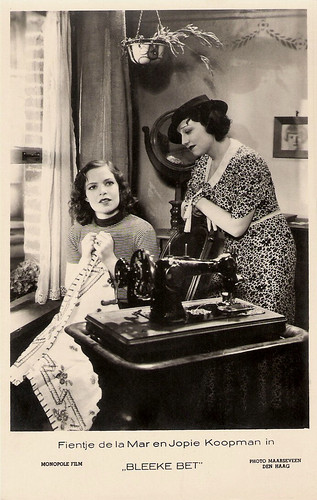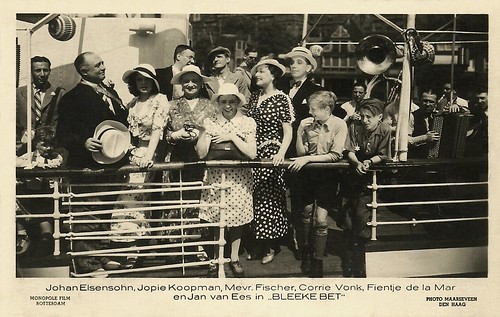These days, Utrecht is the Dutch film city, because of the 2014 Nederlands Film Festival. EFSP presents you the unofficial Dutch film star postcards festival, with today one of the few real film stars of the Netherlands, Fien de la Mar (1898-1965). This Dutch Diva starred in several films during the 1930s of when a Dutch Hollywood was created by German emigrants like Richard Oswald, Ludwig Berger and Max Ophüls. Fien sang a song about this curious phenomenon in the short film Hollandsch Hollywood/Dutch Hollywood (Ernst Winar, 1933).
![Fien de la Mar]()
Dutch Postcard by Monopole Film, Rotterdam. Photo: Dick van Maarseveen. Publicity still for Bleeke Bet (1934).
![Fien de la Mar, Bleeke Bet]()
Dutch postcard by M.B. & Z. (M. Bonnist & Zonen, Amsterdam). Photo: Dick van Maarseveen, Den Haag / Monopole Film. Publicity still of Fien(tje) de la Mar in Bleeke Bet (Alex Benno, Richard Oswald, 1934). Collection: Egbert Barten.
![Fien de la Mar]()
Dutch postcard by JosPe. Sent by mail in 1935. Photo: Godfried de Groot.
Before WW II, the actress and cabaret artist was known as Fientje de la Mar. She was born in 1898 and named after Josephine de Beauharnais, the first wife of Napoleon Bonaparte.
Her grandfather Charles de la Mar was an admirer of the French emperor and had called his son Napoleon (Nap). Both were famous Dutch actors and Fien started her stage career in 1917 when she was still a school girl.
Immediately she showed talent but also a huge temper. She would become a glamorous and capricious stage star, who loved liquor and would have many lovers.
Her feature film debut was the extremely successful musical De Jantjes/The Tars (Jaap Speyer, 1934), one of the first Dutch sound films. The three title characters were played by Willy Costello, Johan Kaartand Fien's lover Jan van Ees.
Fien's second feature was Bleeke Bet (Richard Oswald, Alex Benno, 1934). In this film she sings her torch song Ik wil gelukkig zijn (I want to be happy).
Bleeke Bet (1934) was based on a popular stage melodrama by Herman Bouber, who also wrote the screenplay. His wife, Aaf Bouber played the title role, a greengrocer of the Jordaan, the old neighbourhood in Amsterdam. Bet wants her daughter Jans (Jopie Koopman) to marry a rich man, but Jans loves sailor Ko (the young Johannes Heesters - right on the photo).
The film was a success and would be re-issued in 1941 and 1961. In 1941 the Jewish actors like Sylvain Poons (also on the photo) were cut out of the picture by the Nazi censors. Poons as the ice-cream salesman Sally sings an evergreen in the film, IJslied (Ice-cream Song). The music was composed by emigrant Hans May and the lyrics were written by the later collaborator, Jacques van Tol.
![Aaf Bouber, Sylvain Poons, Corrie Vonk, Fien de la Mar, Jopie Koopman, Mevr. Fischer in Bleeke Bet]()
Dutch postcard by Monopole Film, Amsterdam. Photo: Maarseveen, Den Haag. Clara Vischer-Blaaser, Aaf Bouber, Sylvain Poons, Corry Vonk, Fien de la Mar and Jopie Koopman in the Dutch tragicomedy Bleeke Bet (Richard Oswald, Alex Benno, 1936).
![Fien de la Mar]()
Dutch postcard by M.B. & Z. (M. Bonnist & Zonen, Amsterdam). Photo: Monopole Film / Dick van Maarseveen, Den Haag. Publicity still of Fien(tje) de la Mar in Bleeke Bet (1934).
![Fien de la Mar in Bleeke Bet]()
Dutch Postcard. Photo: Dick van Maarseveen. Publicity still for Bleeke Bet (1934).
![Fien de la Mar & Jopie Koopman in Bleeke Bet]()
Dutch postcard by Monopole Film, Rotterdam. Photo: Dick van Maarseveen. Publicity still for Bleeke Bet (1934) with Jopie Koopman.
![Bleeke Bet (1934)]()
Dutch postcard by Monopole Film, Amsterdam. Photo: Maarseveen, Den Haag. Johan Elsensohn, Jopie Koopman, Clara Vischer-Blaaser, Corry Vonk, Fien de la Mar and Jan van Ees in the Dutch tragicomedy Bleeke Bet (Richard Oswald, Alex Benno, 1934).
![Fien de la Mar & Jopie Koopman in Bleeke Bet]()
Dutch postcard by Monopole Film. Photo: Maarseveen, Den Haag. Fien(tje) de la Mar and Jopie Koopman in the tragicomedy Bleeke Bet (Alex Benno, Richard Oswald, 1934).
Bleeke Bet proved to be another hit and the following year Fien de la Mar would star in three more films. In the musical Op stap/On the Road (Ernst Winar, 1935) she sang a song, spectacularly accompanied by a dozen pianos.
Her co-star in this film was Frits van Dongen who later would have a Hollywood career as Philip Dorn. They also appeared together in the comedy De Big van het regiment/The Regiment's Mascot (Max Nosseck, 1935).
Her later films include Klokslag twaalf/12 'O Clock (Léo Joannon, 1936) - an alternate language version of Quand minuit sonnera (Léo Joannon, 1936) starring Marie Bell, De spooktrein/The Ghost Train (Carl Lamac, 1939) with Jan Musch, and Ergens in Nederland/Somewhere in the Netherlands (Ludwig Berger, 1940) with Lily Bouwmeester and actor-author Jan de Hartog.
A few weeks after the premiere of the latter film the Second World War started and the film was forbidden by the Nazis. In 1943 Fien refused to work for the Nazi regime and her career halted.
After the war she made a glorious stage come-back and she even had her own theatre for a while. She worked for television, but would not make any more films.
Her life ended tragically in 1965. Fien de la Mar jumped out of the window of her Amsterdam apartment and died a few days later in a hospital. Her legend is kept in an excellent biography by Jenny Pisuisse (1982), a CD and in the stage and television musical Fien (Jan Keja, 1985) with Jasperina de Jong as Fien.
![Fien de la Mar in Op stap]()
Dutch postcard by M.B. & Z. (M. Bonnist & Zonen, Amsterdam). Photo: Dick van Maarseveen, Den Haag / Nationaal Film. Publicity still of Fien(tje) de la Mar in Op stap/On the Move (Ernst Winar, 1935) .
![Fien de la Mar, Frits van Dongen in Op stap]()
Dutch postcard by M.B. & Z. (M. Bonnist & Zonen, Amsterdam). Photo: Dick van Maarseveen, Den Haag / Nationaal Film. Publicity still for Op stap/On the Move (Ernst Winar, 1935) with Frits van Dongen.
![Fien de la Mar and Hansje And(e)riesen in De big van het regiment]()
Dutch postcard by NV Monopole Film. Photo: Maarseveen. Fien(tje) de la Mar and Hansje Anderiesen (aka Jansje Andriessen and Hansje Andriesen) in De Big van het regiment (Max Nosseck, 1935).
Clip from Bleeke Bet (1934) with Fien singing Ik wil gelukkig zijn. Source: Brassens66 (YouTube).
Final scene from Op stap/On the Road (1935). Source: CaptainvonTrapp (YouTube).
Sources: Wikipedia, Wim Ibo (Huygens ING) and IMDb.

Dutch Postcard by Monopole Film, Rotterdam. Photo: Dick van Maarseveen. Publicity still for Bleeke Bet (1934).

Dutch postcard by M.B. & Z. (M. Bonnist & Zonen, Amsterdam). Photo: Dick van Maarseveen, Den Haag / Monopole Film. Publicity still of Fien(tje) de la Mar in Bleeke Bet (Alex Benno, Richard Oswald, 1934). Collection: Egbert Barten.

Dutch postcard by JosPe. Sent by mail in 1935. Photo: Godfried de Groot.
Capricious
Before WW II, the actress and cabaret artist was known as Fientje de la Mar. She was born in 1898 and named after Josephine de Beauharnais, the first wife of Napoleon Bonaparte.
Her grandfather Charles de la Mar was an admirer of the French emperor and had called his son Napoleon (Nap). Both were famous Dutch actors and Fien started her stage career in 1917 when she was still a school girl.
Immediately she showed talent but also a huge temper. She would become a glamorous and capricious stage star, who loved liquor and would have many lovers.
Her feature film debut was the extremely successful musical De Jantjes/The Tars (Jaap Speyer, 1934), one of the first Dutch sound films. The three title characters were played by Willy Costello, Johan Kaartand Fien's lover Jan van Ees.
Fien's second feature was Bleeke Bet (Richard Oswald, Alex Benno, 1934). In this film she sings her torch song Ik wil gelukkig zijn (I want to be happy).
Bleeke Bet (1934) was based on a popular stage melodrama by Herman Bouber, who also wrote the screenplay. His wife, Aaf Bouber played the title role, a greengrocer of the Jordaan, the old neighbourhood in Amsterdam. Bet wants her daughter Jans (Jopie Koopman) to marry a rich man, but Jans loves sailor Ko (the young Johannes Heesters - right on the photo).
The film was a success and would be re-issued in 1941 and 1961. In 1941 the Jewish actors like Sylvain Poons (also on the photo) were cut out of the picture by the Nazi censors. Poons as the ice-cream salesman Sally sings an evergreen in the film, IJslied (Ice-cream Song). The music was composed by emigrant Hans May and the lyrics were written by the later collaborator, Jacques van Tol.

Dutch postcard by Monopole Film, Amsterdam. Photo: Maarseveen, Den Haag. Clara Vischer-Blaaser, Aaf Bouber, Sylvain Poons, Corry Vonk, Fien de la Mar and Jopie Koopman in the Dutch tragicomedy Bleeke Bet (Richard Oswald, Alex Benno, 1936).

Dutch postcard by M.B. & Z. (M. Bonnist & Zonen, Amsterdam). Photo: Monopole Film / Dick van Maarseveen, Den Haag. Publicity still of Fien(tje) de la Mar in Bleeke Bet (1934).

Dutch Postcard. Photo: Dick van Maarseveen. Publicity still for Bleeke Bet (1934).

Dutch postcard by Monopole Film, Rotterdam. Photo: Dick van Maarseveen. Publicity still for Bleeke Bet (1934) with Jopie Koopman.

Dutch postcard by Monopole Film, Amsterdam. Photo: Maarseveen, Den Haag. Johan Elsensohn, Jopie Koopman, Clara Vischer-Blaaser, Corry Vonk, Fien de la Mar and Jan van Ees in the Dutch tragicomedy Bleeke Bet (Richard Oswald, Alex Benno, 1934).

Dutch postcard by Monopole Film. Photo: Maarseveen, Den Haag. Fien(tje) de la Mar and Jopie Koopman in the tragicomedy Bleeke Bet (Alex Benno, Richard Oswald, 1934).
Tragic End
Bleeke Bet proved to be another hit and the following year Fien de la Mar would star in three more films. In the musical Op stap/On the Road (Ernst Winar, 1935) she sang a song, spectacularly accompanied by a dozen pianos.
Her co-star in this film was Frits van Dongen who later would have a Hollywood career as Philip Dorn. They also appeared together in the comedy De Big van het regiment/The Regiment's Mascot (Max Nosseck, 1935).
Her later films include Klokslag twaalf/12 'O Clock (Léo Joannon, 1936) - an alternate language version of Quand minuit sonnera (Léo Joannon, 1936) starring Marie Bell, De spooktrein/The Ghost Train (Carl Lamac, 1939) with Jan Musch, and Ergens in Nederland/Somewhere in the Netherlands (Ludwig Berger, 1940) with Lily Bouwmeester and actor-author Jan de Hartog.
A few weeks after the premiere of the latter film the Second World War started and the film was forbidden by the Nazis. In 1943 Fien refused to work for the Nazi regime and her career halted.
After the war she made a glorious stage come-back and she even had her own theatre for a while. She worked for television, but would not make any more films.
Her life ended tragically in 1965. Fien de la Mar jumped out of the window of her Amsterdam apartment and died a few days later in a hospital. Her legend is kept in an excellent biography by Jenny Pisuisse (1982), a CD and in the stage and television musical Fien (Jan Keja, 1985) with Jasperina de Jong as Fien.

Dutch postcard by M.B. & Z. (M. Bonnist & Zonen, Amsterdam). Photo: Dick van Maarseveen, Den Haag / Nationaal Film. Publicity still of Fien(tje) de la Mar in Op stap/On the Move (Ernst Winar, 1935) .

Dutch postcard by M.B. & Z. (M. Bonnist & Zonen, Amsterdam). Photo: Dick van Maarseveen, Den Haag / Nationaal Film. Publicity still for Op stap/On the Move (Ernst Winar, 1935) with Frits van Dongen.

Dutch postcard by NV Monopole Film. Photo: Maarseveen. Fien(tje) de la Mar and Hansje Anderiesen (aka Jansje Andriessen and Hansje Andriesen) in De Big van het regiment (Max Nosseck, 1935).
Clip from Bleeke Bet (1934) with Fien singing Ik wil gelukkig zijn. Source: Brassens66 (YouTube).
Final scene from Op stap/On the Road (1935). Source: CaptainvonTrapp (YouTube).
Sources: Wikipedia, Wim Ibo (Huygens ING) and IMDb.